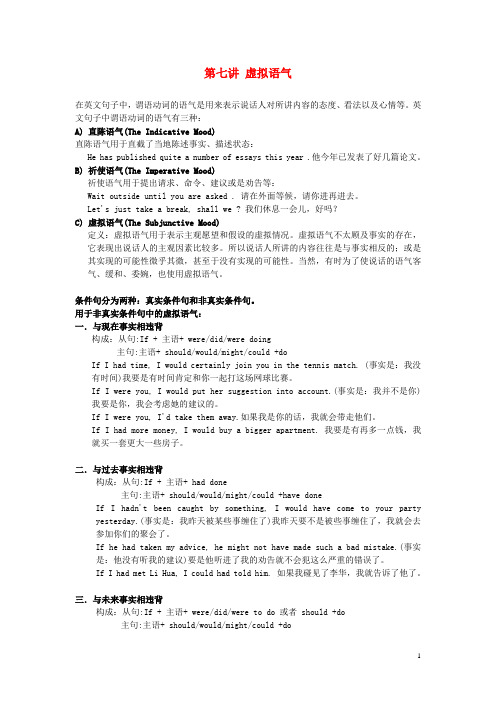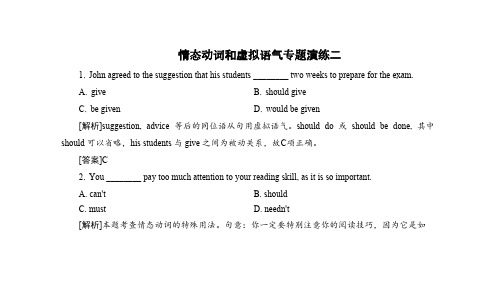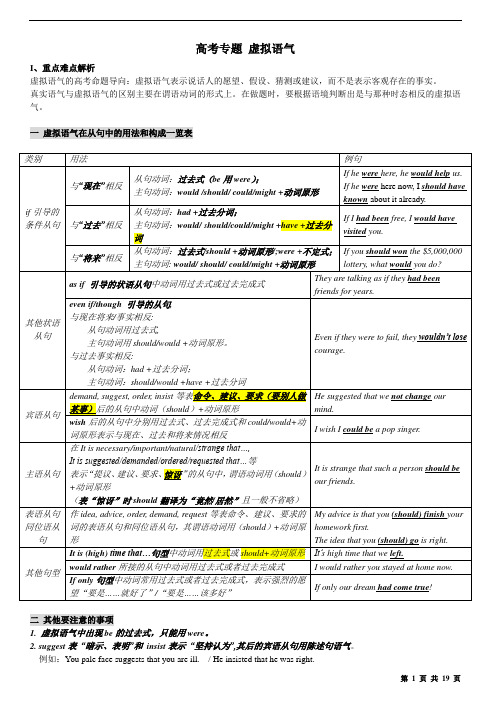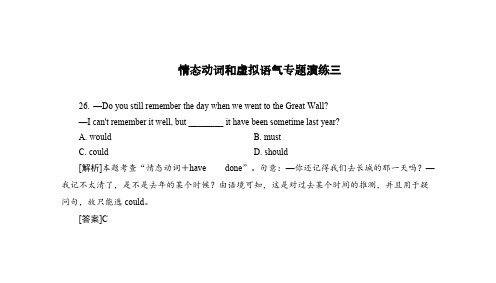【最高考】2016届高考英语语法精讲精练-专题七-情态动词和虚拟语气常考点
- 格式:doc
- 大小:576.50 KB
- 文档页数:14

考点13 情态动词和虚拟语气【命题解读】英语中常用的情态动词主要有can,could,may,might,must,will,would,shall,should,ought to,dare,need,used to,had better等。
在学习情态动词时应注意以下几点:同一情态动词表示不同的意义的情况;情态动词后跟各种形式的用法;尤其要注意"情态动词+完成式"是高考中的重点所在。
对虚拟语气的考查重点在于根据句子的语境灵活多样地运用虚拟语气,宾语从句中虚拟语气的应用,交际用语中为表示委婉而使用的虚拟语气,含蓄条件句中的虚拟语气,以及特殊句型中的虚拟语气等。
【命题预测】情态动词是2021年各地高考试题中的必考项目,每年高考单独命题区的单项填空必有一道考查情态动词的项目。
新课标卷主要在语法填空和短文改错中考查。
考点依次是:推测(可能性)→请求/允许→必要性→特殊用法。
试题的立意不偏不怪,但有效信息越来越隐蔽,语境越来越真实,考查角度越来越细致,这些因素在很大程度上增加了试题的难度。
情态动词和虚拟语气与动词的时态和语态相结合的考查是近年来高考的趋势。
【复习建议】情态动词:1. 掌握情态动词的基本用法;2. 掌握情态动词表达"情感、态度、语气等"方面的用法。
虚拟语气:1. 掌握虚拟语气的基本用法;2. 掌握含蓄虚拟条件句的用法;3. 掌握主从句时间不一致的虚拟条件句的用法;情态动词考向一情态动词的基本用法1)can,could与be able to1.表示能力,意为"能,会"。
☞Many people can use the computer.许多人会用电脑。
☞If you have a good sleep,you will be able to work out this problem.如果你好好睡一觉,你将能够解出这道题。
☞I could have worked out the problem,but I was too nervous.我本来可以解决这个问题,但我太紧张了。

第七讲虚拟语气在英文句子中,谓语动词的语气是用来表示说话人对所讲内容的态度、看法以及心情等。
英文句子中谓语动词的语气有三种:A) 直陈语气(The Indicative Mood)直陈语气用于直截了当地陈述事实、描述状态:He has published quite a number of essays this year .他今年已发表了好几篇论文。
B) 祈使语气(The Imperative Mood)祈使语气用于提出请求、命令、建议或是劝告等:Wait outside until you are asked . 请在外面等候,请你进再进去。
Let's just take a break, shall we ? 我们休息一会儿,好吗?C) 虚拟语气(The Subjunctive Mood)定义:虚拟语气用于表示主观愿望和假设的虚拟情况。
虚拟语气不太顾及事实的存在,它表现出说话人的主观因素比较多。
所以说话人所讲的内容往往是与事实相反的;或是其实现的可能性微乎其微,甚至于没有实现的可能性。
当然,有时为了使说话的语气客气、缓和、委婉,也使用虚拟语气。
条件句分为两种:真实条件句和非真实条件句。
用于非真实条件句中的虚拟语气:一.与现在事实相违背构成:从句:If + 主语+ were/did/were doing主句:主语+ should/would/might/could +doIf I had time, I would certainly join you in the tennis match. (事实是:我没有时间)我要是有时间肯定和你一起打这场网球比赛。
If I were you, I would put her suggestion into account.(事实是:我并不是你)我要是你,我会考虑她的建议的。
If I were you, I'd take them away.如果我是你的话,我就会带走他们。

情态动词主要用来表示说话人的情感、态等,是中英语语法的重点,也是高考的热点,是单项填空必考的一个知识点。
情态动词在近五高考中主要考查四点:情态动词表示推测和可能性的用法;情态动词与虚拟语气;情态动词表达“情感、态、语气等”;情态动词表示“必要性”等方面的用法。
虚拟语气的考点主要集中在名词性从句、条件句中的用法,以及错综条件句中虚拟语气的应用。
一、情态动词表推测的用法headmaster.①That maynot be true.①He couldn'thavediscovered thetruth.注意:should (ought to)表示推测是高考考查的重点和难点。
如:—When can I come for the photos?I need them tomorrow afternoon.—They ________ be ready by 12:00.A.can B.should C.might D.need【解析】B A项表示推测时常用于否定句和疑问句中。
C项表示推测语气不太肯定。
should意为“按理说,理应”,既回答了顾客的询问,不失礼貌,又为照片有可能尚未洗好,顾客到时取不到留下了回旋的余地,体现了店主的精明与用词经过仔细推敲。
二、情态动词的其他用法1.can, could, may, might2.must, should3. need, dare4.shall/will/would4.shall/will/would4.shall/will/would二、情态动词+have done四、虚拟语气虚拟语气表示说话人所说的话不是事实,而是一种假设、愿望、怀疑或推测。
1.虚拟语气在条件句中的用法If it were to rain tomorrow, I should not drive my car. 如果明天下雨的话,我就不开车了。
(明天的情况还不知道)If I had done it in time, I should have had a good time. 如果我及时做的话,日子就好过多了。

情态动词和虚拟语气专题演练二1.John agreed to the suggestion that his students ________ two weeks to prepare for the exam.A.give B.should giveC.be given D.would be given[解析]suggestion, advice 等后的同位语从句用虚拟语气。
should do 或should be done, 其中should 可以省略,his students 与 give 之间为被动关系,故C项正确。
[答案]C2.You ________ pay too much attention to your reading skill, as it is so important.A. can'tB. shouldC. mustD. needn't[解析]本题考查情态动词的特殊用法。
句意:你一定要特别注意你的阅读技巧,因为它是如此重要。
can't...too... 为固定句式,意为“再……也不为过;一定要……”,故A项正确。
[答案]A3.________ everyone have a great Spring Festival!A. CanB. MustC. MayD. Should[解析]本题考查情态动词的特殊用法。
句意:愿大家春节快乐!情态动词may 可以表祝愿,用于倒装句中,故C项正确。
[答案]C4. Naturally, when I tell her what to do, my daughter ________ go and do the opposite!A. mayB. canC. mustD. should[解析]此处主要考查情态动词must 的特殊意思“非要,非得,偏要,偏偏”,表示与说话人愿望相反。
句意:通常,我告诉女儿做什么时,女儿非得做相反的事。

高考专题虚拟语气I、重点难点解析虚拟语气的高考命题导向:虚拟语气表示说话人的愿望、假设、猜测或建议,而不是表示客观存在的事实。
真实语气与虚拟语气的区别主要在谓语动词的形式上。
在做题时,要根据语境判断出是与那种时态相反的虚拟语气。
一虚拟语气在从句中的用法和构成一览表二其他要注意的事项1. 虚拟语气中出现be的过去式,只能用were。
2. suggest表“暗示、表明”和insist表示“坚持认为”,其后的宾语从句用陈述句语气。
例如:You pale face suggests that you are ill. / He insisted that he was right.3. if虚拟语气条件句中如有had, should, were,可省略if, 将其提前引起倒装。
例如:Were I you, I would remain. / Had you told me earlier, I wouldn’t have missed it.4. 可用without, but for(“要不是”)代替虚拟语气条件句。
例如:But for your help, I would have failed the exam.Without air there would be no life.5.as if/though, even if/though也可以不用虚拟,表示真实的情况。
例如:It looks as if it is going to rain.II、实战演练用所给动词的适当形式填空1.---If he ________________ (warn), he ________________ (not take) that food.---Luckily he was sent to the hospital immediately.2.When a pencil is partly in a glass of water, it looks as if it _________________ (break).3.I would rather they _________________ (not hear) of the news.4.I wish I _______________ (have) a room of my own when I was a child.5.To the surprise of the public, the identification of the cause of such a simple event ___________________ (take)more than a year.6.Without air to hold some of the sun’s heat, the earth at night _______________ (be) freezing cold, too cold for us tostay.7.If I had worked harder at school, I _____________________(sit) in a comfortable office now.8.Her pale face suggested that she _____________ (be) ill, and her colleagues suggested that she _____________(have) a medical examination.9.I insisted he ____________ (go) to see a doctor, but he insisted nothing __________ (be) wrong with him.10.He asks that he _______________ (give) an opportunity to explain why he’s refused to go there.11.It is high time we _____________ (get) down to discussing this plan.12.If it were not for the fact that you ___________ (be) too busy, I would ask you to help me do this right now. (=butfor)13.Who do you suggest __________________ (send) to work there?14.I would have come earlier, but I ________________ (not know) that you were waiting for me.15.If it _______________ (rain) tomorrow, the outing would be cancelled.高考专题---虚拟语气2多数中国人对虚拟语气的理解是:虚拟语气表示说话人的愿望,是假设的,虚构的,与事实相反的,或者是不太可能的。

情态动词和虚拟语气专题演练三26.—Do you still remember the day when we went to the Great Wall?—I can't remember it well, but ________ it have been sometime last year?A. wouldB. mustC. couldD. should[解析]本题考查“情态动词+have done”。
句意:—你还记得我们去长城的那一天吗?—我记不太清了,是不是去年的某个时候?由语境可知,这是对过去某个时间的推测,并且用于疑问句,故只能选 could。
[答案]C27.What a pity! Considering his intelligence and diligence, he ________ a higher grade.A. can have achievedB. must have achievedC. need have achievedD. might have achieved[解析]本题考查“情态动词+have done”。
can have done“过去可能干过”,一般不用于肯定的陈述句;must have done,“过去肯定干过”;might have done 意义有两层:一表示“过去可能干过某事”;二表示“过去本可能干某事而事实上没干”;由句意“真遗憾!鉴于他的智力和努力,他本来能够获得一个更高一点的分数”可知D项正确。
[答案]D28.—Where is my dictionary? I remember I put it here yesterday.—Perhaps, you ________ it in the wrong place.A. must have putB. should have putC. can have putD. might have put[解析]本题考查情态动词。
语法专项情态动词一.情态动词的含义:情态动词只有情态意义,即表示说话人对动作的观点,如需要,可能,意愿或怀疑等。
情态动词主要有:can(could), may(might), must, shall(should), will(would), need, dare(dared), have to(had to),ought to, had better,would rather, used to等。
二.情态动词的特征:1.在形式上,情态动词没有实义动词的各种变化,只有could, would, had to, might, should等几个过去式。
其他如must, ought to等的过去式皆与现在式同形,且在各种人称后都用同样的形式。
2.在意义上,大多数情态动词有多个意义。
如can可表示“能够”,“可能”,“允许”等。
3.在用法上。
情态动词(除ought后接不定式外)与助动词一样,后接动词原形构成谓语动词。
三.情态动词的用法:(一)can/could的用法:1.表示能力:①表示现在的能力用can;表示过去的一般能力用could,若表示过去经过努力而做成某事,则用was/were able to do sth. 或managed to do sth. 或succeeded in doing sth.---Everyone here can speak English. (现在的能力)---A fire broke out in the hotel last night, but everyone was able to escape. (经过努力做成某事)②表示将来的能力常不用can,而用will be able to的将来时态:---I’ll be able to speak French in another few months.2.表示请求许可:若表示请求别人允许自己做某事,can/could均可,could表示委婉语气。
专题七 情态动词和虚拟语气常考点 近两年考查情态动词和虚拟语气的频率呈上升趋势。从整体上把握情态动词的语法特征和语义特征,能够准确理解不同情态动词的细微差异,认真区别具有相同功能、意思相近的情态动词的用法,在真实的交际情景中印证和领悟情态动词的用法和特征。
1 情态动词所表示的多种含义
1. can和could的用法 ①表示能力。如: I can run fast. ②表示客观可能性。如: An experienced driver can have an accident at times. ③表示请求和允许。用could 语气更委婉。如: —Can/Could I go now? —Yes,you can. ④表示猜测、惊异、怀疑、不相信的态度(主要用于否定句、疑问句或惊叹句中)。如: Can this be true? How can you be so careless! This cannot be done by him. 2. may和might的用法 ①表示许可。如: You may drive the car. —May/Might I use your pen? —No,you mustn't. ②用于祈使句中表示祝愿。如: May you succeed! ③表示推测、可能(疑问句不能用于此意)。表推测的might并不是指过去时间,而表示比may把握性略小些。如: He may be very busy now. ④用于表示目的或让步状语从句中。如: No matter what difficulties you may come across,you shouldn't give up. 3. will和would的用法 ①用于各种人称,表示“意志”“意愿”“决心”等。如: I told her to stop crying,but she just would not listen. ②用于第二人称的疑问句,表示说话人向对方提出请求。用would比用will语气更客气。如: Will/Would you please keep the door open? ③表示真理或习惯,意为“惯于,总是”。 如: She will listen to music alone in her room for hours. He would get up early when he lived in the country. 4. should的用法 ①表示现在或将来的责任或义务,意为“应该,应当”,这时它可以和 ought to,be supposed to 互换使用。如: You should(=are supposed to ) complete your test in time. ②表示有较大可能实现的猜测、推论,通常意为“可能;总该……吧”,相当于 be expected to。如: They should be home by now,I think. ③用于第一人称时可以表示说话人的一种谦逊、客气、委婉的语气。如: I should think it would be better to try it again. ④用在条件状语从句中,表示语气较强的假设,意为“万一”,这时也可将should置于从句之首,即将should放在主语前面,而省略从属连词if,主句谓语却不一定用虚拟语气。如: Should I (=If I should) be free tomorrow I will come. ⑤用来表示意外、惊喜或者在说话人看来是不可思议的。尤其在以 why,who,how 等开头的修辞疑问句或某些感叹句中常常意为“竟会,居然”。如: A gentleman like him should be rude to a lady! ⑥用于虚拟语气句中(略)。 5. ought to的用法 表示应该、推测,相当于should。 如: You ought to take care of him. 6. shall的用法 ①用于第二、三人称,表示说话人的意愿,有“命令”“警告,威胁,强制”“法令条文规则”和“允诺”等意思。 如: You shall have the book when I finish reading.(表允诺) ②在疑问句中,shall用于征求对方的意见或请求指示,常用于第一、第三人称。如: Shall we go out for a walk? Where shall he wait for us? 7. must的用法 ①表示义务、意图或建议,意为“必须,应该,禁止(用于否定句中)”。 如: You must go and see that film—you'd really enjoy it. ②表示推测,意为“必定,一定”。 [注]must表示推测时的否定式是can't或couldn't(不可能)。 ③表示主,意为“硬要,一定要”。如: If you must go,at least wait till the rain stops. ④表示与说话人愿望相反,意为“偏要”。如: The machine must break down at this busy hour. 8. need和dare的用法 ①need 作“必要”讲时,既可作情态动词,也可作实义动词。作实义动词时后面的动词不定式要带to,其变化与一般动词相同。作情态动词时,仅用于否定句或疑问句中。 ②dare作为情态动词时,仅用在疑问句、否定句和条件从句中。dare若作实义动词,后面可接带to的不定式,此时to也可以省略。dare与need的用法相似。如: He dares to go there alone. He needs to go there alone. She doesn't dare (to) ask her father. She doesn't need to ask her father. He daren't speak English before such a crowd,dare he? 9. used to的用法 used to表示过去的习惯动作或状态,现在已不存在,在间接引语中,其形式可不变。在疑问句、否定句、否定疑问句或强调句中,可有两种形式。
疑问句 ·Did you use to go to the same school as your brother? ·Used you to go to the same school as your brother?
否定句 ·I usedn't to go there. ·I didn't use to go there.
否定疑问句 ·Usen't you to be interested in the theatre? ·Didn't you use to be interested in the theatre? 其反意疑问句或简略回答中,也有两种形式: She used to be very fat,didn't she?(正式)/use(d)n't she? (口语) —Used you to get up early in the morning? —Yes,I did(正式)./Yes,I used to.(口语) 10. would rather (not) do 宁愿(不)做 11. had better (not) do 最好(不)做
①I ________ often go fishing when I lived in the countryside. A. should B. would C. could D. might ②I've decided to take the job and I ________ change my mind. A. mustn't B. can't C. won't D. may not ③“Whatever you want,you ________ have it on condition that you get the best result,” said the boss. A. would B. ought to C. shall D. could ④—Why ________ you stay in the countryside,where it's not convenient to go shopping? —But I've found it rather valuable for my health. A. can B. must C. may D. shall ⑤—I promise her daughter ________ get a nice present on her birthday. —Will it be a big surprise to her? A. should B. must C. would D. shall ⑥She just couldn't believe that her husband,to whom she had been loyal for so many years,________ desert her after he became rich. A. might B. should C. shall D. must ⑦—A Mr. Smith is waiting outside for the appointment with you. ________ he come in? —Yes,please let him in. A. Shall B. May